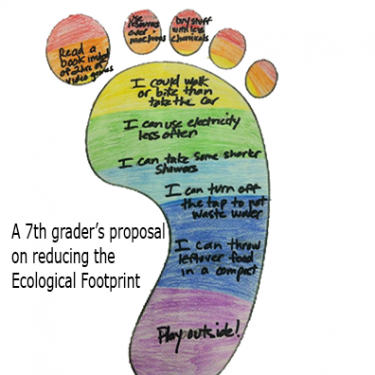 Footprint Calculator: Measure your own Ecological Footprint with an online Footprint calculator (desktop computer required, available in several languages). The calculator tells you how many Earths would be required if everyone on the planet lived like you, and then suggests ways to reduce your Ecological Footprint. footprintcalculator.org
Footprint Calculator: Measure your own Ecological Footprint with an online Footprint calculator (desktop computer required, available in several languages). The calculator tells you how many Earths would be required if everyone on the planet lived like you, and then suggests ways to reduce your Ecological Footprint. footprintcalculator.org
Footprint Drawing: Suggest ways to reduce your Ecological Footprint in a drawing like the one by the seventh grader at left.
Lesson Plan: What day is Earth Overshoot Day? (appropriate for 6th-12th Grades). The purpose of this activity is to understand the concepts and metrics of Ecological Footprint and biocapacity, and why addressing ecological resource constraints is essential to global sustainability.
Footprint Futures: Global Footprint Network’s university-level curriculum. www.footprintnetwork.org/2016/05/01/footprint-futures
Population Conversation: Population is a particularly challenging and sensitive topic, yet its impact is underestimated. If presented well, discussing the population factor can be an empowering and engaging learning opportunity. We created materials for engaging classroom discussions, starting with voices from around the world addressing the question “should we even discuss population?” The voices are complemented with an in-depth essay, which strengthens teachers’ background on the topic and includes a list of questions to stimulate classroom conversations. For the more mathematically inclined, we produced a downloadable population cohort calculator sheet to project population change.
A virtual escape room: Food Odyssey is a project where innovation meets education! This ongoing project already has open-access educational materials available. Check it out.
Create your own activity: Email us at media@footprintnetwork.org to tell us what you will do about your Ecological Footprint.
Additional Resources
Footprint Futures, a university-level curriculum for exploring the sustainability challenge facing human economies, from Global Footprint Network.
EUSTEPs aims to educate European university students and the wider academic community about the complexity of sustainability and its interdisciplinary nature in an engaging and captivating manner, using the Ecological Footprint.
The Fish Game, from The Cloud Institute for Sustainability Education
Terracycle curriculum lesson sets from The Cloud Institute for Sustainability Education
